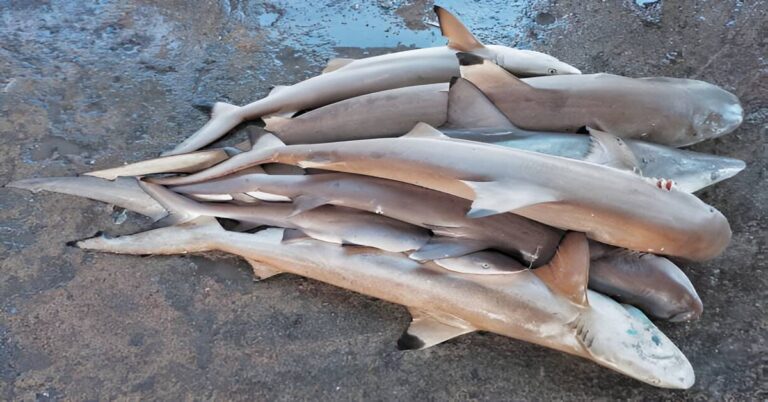Eating shark meat is a concept that’s been floating around for centuries in many cultures, but for most of us, it’s a bit of an unknown territory. I’ll be honest, I was always a little curious. But, after looking into it, I learned that shark meat isn’t as simple as just being another fish you can eat. The health risks, environmental consequences, and cultural implications are way deeper than I expected. So, can you eat shark? Let’s break it down and explore what’s behind the question.
Key Points:
- Shark meat is commonly consumed in certain cultures, but there are health risks.
- Shark meat contains harmful toxins, such as mercury, lead, and arsenic.
- Sharks are crucial for ocean ecosystems, so eating them comes with ethical considerations.
What is Shark Meat?
So, what exactly is shark meat? It’s not like the typical fish fillet we’re used to. Shark meat comes from – you guessed it – sharks. Different species of sharks are hunted for their meat, such as the mako or hammerhead. Shark meat is known for its firm texture and strong, somewhat fishy flavor, which can be an acquired taste. If you’ve ever heard of “Rock Salmon” or “Flake,” well, that’s usually just a cleverly marketed way of selling shark meat in certain places like the UK and Australia.
What’s fascinating (and a little disturbing) is that this meat is often sold without much context about its origins or risks. It’s marketed like any other fish, but when you dive deeper into what’s lurking in shark meat, it’s a whole different story.
Why Do People Eat Shark Meat?
In many coastal communities, shark meat has been a part of the diet for generations. It’s a major food source in some areas. Cultures in parts of Asia, like Japan, serve shark meat in traditional dishes such as shark fin soup, which has become an infamous luxury dish. But why, exactly, do people eat it? Well, the main reason is that it’s readily available in certain fishing regions, and sharks are easy to catch in large numbers.
On a personal note, I remember trying shark meat once when I was traveling to a coastal village. It was served as part of a local dish, and I’ll be honest – I didn’t love it. It was chewy, and the fishy taste was far stronger than anything I’d ever experienced. However the community I was visiting relied heavily on it, and it made me think about how different food practices are in other parts of the world.
However, not all shark meat is consumed for its taste. In some cultures, it’s seen as a symbol of status or wealth. It’s not about the flavor or the texture but about the rarity and expense of obtaining it. And this is where things start getting a little murky when we think about the ethical side of eating sharks.
Is Shark Meat Safe to Eat?
Alright, here’s the big question: Is it safe to eat shark meat? The short answer is: not really. Now, I’m not here to be dramatic, but when you think about all the toxins lurking in shark meat, it’s hard to ignore. Sharks are at the top of the food chain in the ocean, which makes them incredible predators, but it also means they accumulate a lot of toxins in their bodies. This process is called biomagnification, and it means that the higher up you are in the food chain, the more concentrated the toxins become.
Let’s take mercury as an example. If you’ve ever heard of mercury poisoning, you know it’s a big deal. Sharks can accumulate toxic levels of methylmercury, a form of mercury that’s especially harmful to humans. It affects your nervous system, and memory, and can even cause brain damage. That’s pretty scary, right? So imagine eating shark meat, which can have dangerously high levels of mercury. Even though some people argue that smaller sharks might have fewer toxins, the truth is that it’s hard to say for sure how much toxin is in the meat of any given shark. And if you’re eating a young shark, the risk is still there because of other toxins, like PCBs and DDTs, which can pass from the mother to the baby shark.
To make things more complicated, mercury and other toxins don’t just go away when the meat is frozen or cooked. Once you consume it, the toxins stay in your body, slowly building up over time, which can result in some serious health problems. I think about it like putting your body through an ongoing detox challenge – but without the benefits!
Here’s a quick breakdown of the common toxins found in shark meat and their potential impacts:
| Toxin | Potential Health Risks |
| Methylmercury | Brain damage, memory loss, cognitive issues, kidney damage |
| Lead | Headaches, seizures, coma, pain |
| Arsenic | Skin damage, kidney/liver issues, cancer, death |
| Urea | Ammonia buildup, bad odor, potential digestive distress |
When I learned about all this, it really made me pause and reconsider whether it’s worth eating shark meat. Sure, it might be an interesting experience or cultural delicacy, but the risk of poisoning just isn’t worth it in the long run.
The Verdict?
So, can you eat shark? Technically, yes. People have been doing it for centuries. But should you eat shark? That’s a much tougher question. The health risks associated with eating shark meat are significant. From methylmercury to lead and arsenic, the toxins found in shark meat aren’t something to take lightly.
In my opinion, if you’re considering eating shark meat, it’s important to think about both your health and the environmental consequences. Sharks play a vital role in maintaining ocean health, and consuming them could contribute to their decline. If you love the ocean as much as I do, it might be time to look at other seafood options that are safer, more sustainable, and don’t come with the same level of environmental baggage.
The Global Impact of Shark Fishing on Marine Ecosystems
Shark populations are on the decline, and unfortunately, overfishing for shark meat and fins is one of the main reasons. It’s not just about the sharks themselves—this practice affects the entire marine ecosystem. When sharks are taken out of the equation, the ripple effect on ocean life is devastating. Imagine removing a key player from any team; the whole structure falls apart. Sharks serve as the keystone species in the marine food chain, regulating populations of other animals. When their numbers drop, smaller fish, crustaceans, and even coral reefs suffer.
I first learned about the importance of sharks in marine ecosystems when I read a fascinating study about the role of apex predators. Sharks help to keep prey species under control, preventing any one group from overwhelming the ecosystem. This delicate balance is what keeps the ocean’s ecosystems healthy. Without sharks, populations of smaller fish, like herbivorous fish, grow unchecked, leading to overgrazing of essential marine plants like seagrass. This can ultimately harm entire ecosystems, including coral reefs that rely on healthy seagrass beds for stability.
If we continue to target sharks for their meat, we risk not only depleting their numbers but also throwing the whole marine ecosystem off balance. That’s why conservation efforts to protect sharks and regulate shark fishing are so crucial. Preserving shark populations isn’t just about saving a species—it’s about protecting the future of the oceans themselves.
Here’s a table to break down how sharks help regulate marine ecosystems:
| Shark Role | Impact on Marine Ecosystem |
| Regulator of Species | Keeps populations of smaller fish in check, preventing overgrazing and maintaining balance |
| Marine Health | Sharks help maintain the health of marine plants like seagrass, essential for the stability of coastal ecosystems |
| Ecological Balance | As apex predators, sharks contribute to the overall balance of the food web, supporting the biodiversity of marine life |
When sharks are absent, the effects can be seen in the food chain. Smaller fish populations explode, coral reefs suffer, and larger marine animals lose their place in the ecosystem. The consequences are far-reaching and cannot be ignored.
Can You Eat Shark Without Harming the Environment?
Now that we understand the environmental consequences of eating sharks, the question becomes: Can you eat sharks in a way that doesn’t harm the planet? Unfortunately, the short answer is no. The global demand for shark meat and fins is so high that it has led to overfishing and illegal fishing practices. This is not only unethical but also unsustainable. Even when sharks are caught legally, their slow reproductive rate makes it difficult for populations to recover. A single shark might take years to reach sexual maturity, which makes it hard for the species to replenish itself if their numbers continue to dwindle.
I’ve seen how overfishing affects local communities. In some places, shark meat is a vital source of protein, but even in these cases, alternative sources of nutrition exist. By shifting away from shark consumption and choosing sustainable seafood options, we can contribute to the preservation of marine ecosystems. There are so many other fish species that are available without the same negative impact on marine biodiversity. If we truly care about the oceans and the future of marine life, we must rethink what we eat and how it affects the environment.
The bottom line is that there is no way to consume shark without contributing to a decline in their population and a disturbance to the ecosystems they help regulate. The demand for shark meat only perpetuates this cycle of destruction. Instead, we should opt for seafood that is sustainably sourced and supports healthy ocean ecosystems.
Are There Health Risks Involved in Eating Shark?
Aside from the ethical and environmental concerns, there are also significant health risks involved in eating sharks. Sharks, as apex predators, accumulate high levels of toxins, particularly mercury. This accumulation of toxins is due to a process called biomagnification. As smaller fish are eaten by larger ones, and those larger fish are consumed by sharks, the toxins build up over time. This results in shark meat containing higher levels of mercury and other harmful substances than most other types of seafood.
The health risks associated with eating shark are not to be taken lightly. Methylmercury is a toxic substance that can cause long-term damage to the nervous system, including cognitive dysfunction, memory loss, and even brain damage. For pregnant women and young children, the risks are even higher, as exposure to mercury can cause birth defects and developmental issues. This is something I find incredibly concerning. I wouldn’t want to put myself or my loved ones in danger just to satisfy a craving for shark meat.
Additionally, lead, arsenic, and urea—another byproduct of shark decomposition—are present in shark meat, further increasing the health risks. Lead poisoning can cause seizures, headaches, and organ damage. Arsenic is a known carcinogen, and prolonged exposure can lead to severe health issues, including cancer. Urea, which sharks excrete to regulate their bodies in salty water, can turn into ammonia when the shark is killed, giving the meat an unpleasant smell. This smell is often masked with milk, but it’s still a sign of the meat’s deteriorating quality.
Here’s a quick table summarizing the health risks of eating shark:
| Toxin | Health Risks |
| Methylmercury | Brain damage, cognitive dysfunction, memory loss, birth defects |
| Lead | Seizures, headaches, organ damage |
| Arsenic | Cancer, organ failure, lung damage, death |
| Urea | Digestive distress, bad odor, potential for ammonia exposure |
The Future of Shark Populations
As the demand for shark meat continues to rise, we must take steps to protect these magnificent creatures. Many countries have enacted regulations to prevent the overfishing of sharks, but illegal fishing still poses a major threat to their survival. In the long term, the continued hunting of sharks for their meat will lead to the extinction of many species.
It’s up to us, as consumers, to demand sustainable alternatives and stop supporting the trade in shark meat. This might involve making better choices at the grocery store or when dining out. Many fish species are sustainably caught and are a much better alternative to shark meat.
To truly protect sharks, we need a combination of legal protection and consumer education. We can choose to be part of the solution rather than contribute to the problem. The future of our oceans and marine life depends on the actions we take today.
FAQ
Can you eat shark meat safely?
Eating shark meat can be dangerous due to high levels of mercury and other toxins that accumulate in their bodies over time.
Why is shark meat toxic?
Sharks accumulate toxins such as mercury, lead, and arsenic because of their position at the top of the food chain, causing these substances to biomagnify.
What are the health risks of eating shark meat?
Consuming shark meat can lead to brain damage, cognitive dysfunction, birth defects, and even cancer due to toxins like mercury and arsenic.
Are there alternatives to eating shark?
Yes, there are many sustainable seafood options available, such as sustainably caught fish or plant-based alternatives that mimic the taste and texture of seafood.
Why is shark meat dangerous for pregnant women?
Sharks contain high levels of mercury, which can cause birth defects and developmental problems in babies if consumed by pregnant women.
How does shark meat impact the environment?
Eating shark meat contributes to the overfishing of sharks, which destabilizes marine ecosystems and threatens the balance of ocean life.
Can I find sustainable shark meat options?
Unfortunately, due to the slow reproductive rates of sharks, there is no truly sustainable way to consume shark meat without negatively impacting shark populations.
What are the benefits of sustainable seafood?
Sustainable seafood options help protect marine ecosystems, reduce overfishing, and support the health of ocean life without harming vulnerable species like sharks.
How does shark fishing affect coral reefs?
Shark populations regulate smaller fish populations, which, in turn, helps maintain the health of coral reefs. When sharks are removed, coral reefs can suffer from overgrazing and disruption.
Why should we stop eating shark meat?
Eating shark meat contributes to their decline and harms both the health of our oceans and our own well-being due to the toxins found in their meat.
Conclusion
Eating shark meat may seem tempting to some, but when you consider the environmental impact, health risks, and ethical concerns, it’s clear that the costs far outweigh any potential benefits. Sharks play a vital role in maintaining the delicate balance of marine ecosystems, and by removing them from the equation, we risk damaging the very systems that sustain ocean life. Furthermore, the toxins found in shark meat, like mercury and arsenic, pose significant health risks that make consuming sharks an unwise choice for anyone.
Fortunately, there are plenty of alternatives to shark meat that are both delicious and sustainable. From responsibly sourced fish to plant-based seafood options, we have the power to make better choices that support ocean conservation while still enjoying the flavors of the sea. The time to take action is now. By making informed choices and supporting sustainable practices, we can help ensure that sharks, and our oceans, remain healthy for future generations. Let’s stand up for sharks and protect the health of our oceans today.





